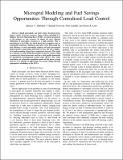Microgrid Modeling and Fuel Savings Opportunities Through Direct Load Control
Author(s)
Shabshab, Spencer C; Nowocin, John Kendall; Lindahl, Peter; Leeb, Steven B.
DownloadAccepted version (1.045Mb)
Open Access Policy
Open Access Policy
Creative Commons Attribution-Noncommercial-Share Alike
Terms of use
Metadata
Show full item recordAbstract
© 2018 IEEE. Small microgrids can derive their electrical power from a variety of energy resources. Some of these microgrids, including U.S. Military Forward Operating Bases (FOBs), use diesel generators as the primary or sole resource. In almost all cases, efficient utilization of generation resources is a high priority. This is particularly so for FOBs, for which diesel fuel resupplies come at remarkable monetary, logistical, and safety costs. Increasing the fuel efficiency of such microgrids requires not only incremental improvements to generation and load services, but also a higher-level understanding of how these components interact. This study of a typical U.S. Army FOB characterizes its power system, which is powered by diesel generators and has a load profile dominated by distributed environmental control units (ECUs). The study contributes an actionable simulation model of this power system and uses it to identify an opportunity for energy savings through appropriate scheduling of the ECUs.
Date issued
2018-10Department
Massachusetts Institute of Technology. Department of Electrical Engineering and Computer Science; Massachusetts Institute of Technology. Research Laboratory of ElectronicsJournal
IECON 2018 - 44th Annual Conference of the IEEE Industrial Electronics Society
Publisher
IEEE
Citation
Shabshab, Spencer C., Nowocin, J. Kendall, Lindahl, Peter and Leeb, Steven B. 2018. "Microgrid Modeling and Fuel Savings Opportunities Through Direct Load Control."
Version: Author's final manuscript
ISBN
9781509066858
9781509066841